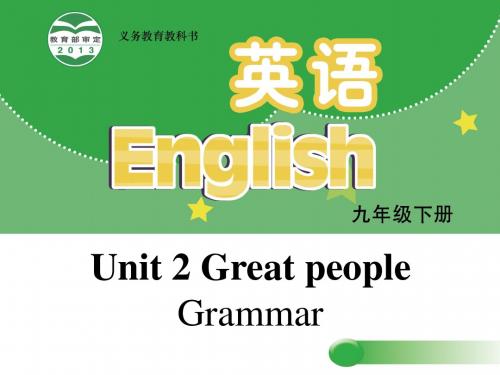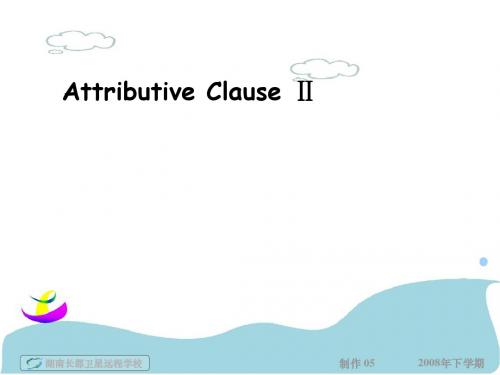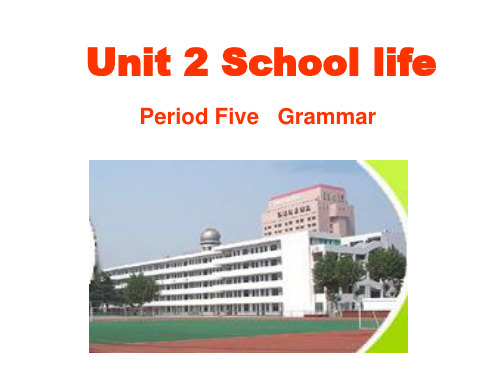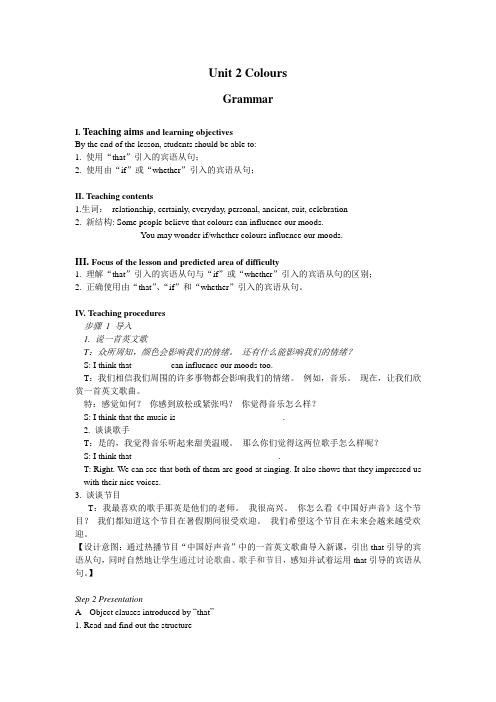U2 Grammar
九下U2 Grammar 课件

Your turn now!
The simple past tense (一般过去时)
Sentences
Simon played football yesterday. Simon came home, turned on the computer and checked his email.
Used for actions that happened in the past. Actions that happened one after another in the past.
I (1)will _________ have (have) a day out with my classmates this Saturday, so I (2) ________ (need) a pair of trainers. need Mum (3) __________ is shopping (shop) online for me now. is searching She often (4) shops _______ (shop) online. Dad (5) _________ (search) for Information on the Internet. will visit (visit) Japan next week. Grandpa He (6) ________ is reading (read) the newspaper and Grandma (7) ____________ is watching(watch) TV. I (9) _________ want (8) _________ (want) to writ go an email to Wendy before I (10) ______ (go) to bed.
高一英语《U2Grammar》(课件)

湖南长郡卫星远程学校
制作 05
2008年下学期
preposition (介词)+ which/whom
湖南长郡卫星远程学校
制作 05
2008年下学期
二. 根据从句中的形容词短语来确定介词 The two subjects __ ______ I’m interested in which are English and maths.1. be interested in
The snake ___ _____ she used to be afraid of which is her favorite animal now. 2. be afraid of These are some books _____ which I am not very familiar.
一.根据从句的谓语动词确定介词
This is the village __ ______ we often go.
This is the book ___ _____ you asked.
湖南长郡卫星远程学校
制作 05
2008年下学期
preposition (介词)+ which/whom
一.根据从句的谓语动词确定介词
湖南长郡卫星远程学校
制作 05
2008年下学期
Comparison
1) The room ______ where he once lived is still there. 2) The room _____ I have to clean every day belongs to my mother. 1) The reason _____ I don’t know is known to him. 2) The reason _____ I don’t know the thing is that I was not there at that time. 1) I will never forget the day______ I met you. 2) I will never forget the day _____ we spent together.
U2 Grammar

【梳理】 主语 (如例句1)。 1.动词不定式可以在句中作_____ It 2.在例句2和例句3中,_____ 是形式主语,真 动词不定式 。 正的主语是后面的___________
Unit 2 Grammar
We can use an infinitive as the subject of a sentence.
Unit 2 Grammar
A2 Complete the paragraph below with the words from the box.
become a scientist do Maths
go to university try again
At school, Einstein’s ability (1)___________ to do Maths surprised his teachers, but he was bored with other subjects. At the age of 15, he was given the chance (2)__________________, to go to university but he did not do well enough in the exam.
八上U2Grammar课件

Sheh_a_s__t_h_e__le_a_s__t money of all.
Comparing the amount of things
many ( +可数名词) much (+不可数名词)
more
more… than … 比…多 (两者之间比较)
the most
the most 最多 (三者或三者以上)
Comparatives and superlatives of adverbs: 根据句意, 写出括号中所给词的正确形式. 1. She sang even _w__o_r_se_ (差) than usual.
2. Mother asked her son to walk a bit _f_a_s_te_r_ (快).
the worst
far
farther / further
the farthest / the furthest
SB Page 24: My classmates 1. well … better … the best 2. high … higher … the highest 3. fast … faster … the fastest 4. quickly … more quickly … the most quickly
Unit 2 School life
Period Five Grammar
A. Comparing the amount of things
Tom
magazines
10
erasers
1
John 20 2
Jack 30 3
Tom has many magazines. John has more magazines than Tom. Jack has the most magazines of the three.
U2 Grammar 教案2021-2022学年牛津译林版九上

Unit 2 ColoursGrammarI. Teaching aims and learning objectivesBy the end of the lesson, students should be able to:1. 使用“that”引入的宾语从句;2. 使用由“if”或“whether”引入的宾语从句;II. Teaching contents1.生词:relationship, certainly, everyday, personal, ancient, suit, celebration2. 新结构: Some people believe that colours can influence our moods.You may wonder if/whether colours influence our moods.III. Focus of the lesson and predicted area of difficulty1. 理解“that”引入的宾语从句与“if”或“whether”引入的宾语从句的区别;2. 正确使用由“that”、“if”和“whether”引入的宾语从句。
IV. Teaching procedures步骤 1 导入1. 说一首英文歌T:众所周知,颜色会影响我们的情绪。
还有什么能影响我们的情绪?S: I think that ________ can influence our moods too.T:我们相信我们周围的许多事物都会影响我们的情绪。
例如,音乐。
现在,让我们欣赏一首英文歌曲。
特:感觉如何?你感到放松或紧张吗?你觉得音乐怎么样?S: I think that the music is ________________________.2. 谈谈歌手T:是的,我觉得音乐听起来甜美温暖。
那么你们觉得这两位歌手怎么样呢?S: I think that _________________________________.T: Right. We can see that both of them are good at singing. It also shows that they impressed us with their nice voices.3. 谈谈节目T:我最喜欢的歌手那英是他们的老师。
高中英语-M22-U2-Grammar课件-牛津版选修22

2.ride a skateboard
3.feel at home 感觉自在 4.look at stars through a
telescope
第十页,编辑于星期四:二十三点 四十四分。
Key sentences:
1. My mum suggested that I join
第四页,编辑于星期四:二十三点 四十四分。
5. biochemistry n. 生物化学
6. analytical adj. 分析的
7. lawyer n.
律师
8. firm n.
公司
第五页,编辑于星期四:二十三点 四十四分。
9. law firm 律师事务所 10. adjustment n. 调整 11. bungalow n. 平房, 小屋 12. go bowling 打保龄球
1d
2a
第十四页,编辑于星期四:二十三点 四十四分。
Homework
Memorize the new words or phrases on P25-27
第十五页,编辑于星期四:二十三点 四十四分。
around the city. (Para.3)
第十二页,编辑于星期四:二十三点 四十四分。
Consolidation: C1, C2, P108
第十三页,编辑于星期四:二十三点 四十四分。
Answers to C1:
d, g, h, j, e, a, f, b, i, c
Answers to C2:
P24
第二页编辑于星期四:二十三点 四十四分。
New words and phrases in A and B (Page 25)
U2 Grammar
Adverbs and adverbial phrases of frequency:
We use adverbs and adverbial phrases of frequency wash face getto up take how a bath talk about often things happen. read newspaper She gets up at 6:30 every day. Tom takes a bath twice a day. Mary is seldom late for classes. Lily never reads newspaper at school. Adverbs of frequency come (before/after) the main verbs (before/after) the be verbs. 2. Adverbial phrases of frequency often come (in the middle/at the end) of a sentence. Sometimes they come at the beginning.
动词一般现在时第三人称单数变化规则
1. 一般的动词后面直接加-s walk walks
2. 以-s,-x, -sh或-ch结尾的动词后加-es discuss discusses 3. 以辅音字母 + y 结尾的动词,变y 为i再加-es study studies
4. 特殊变化 do does
More practice:
一般现在时的特殊用法
如果主句为一般将来时,if, unless等引导的条件状语 从句和when, until, as soon as等引导的时间状语从句 常用一般现在时表将来。如: I will call you as soon as I arrive. He will go to the zoo if it doesn’t rain. 如果直接引语是表示客观真理,变为间接引语时仍然用 一般现在时。 He said the light travels faster than the sound. Practice: 1.What is he going to be when he grows ____ (grow) up? come 2. I’ll be here until you ____(come) back. 3. We shall not go if it rains _____(rain) tomorrow. 4. He told me that the earth turns ____(turn) around the sun.
九年级上册(初三上学期)英语U2 Grammar 课件
Should she choose an English song for the next battle?
She wants to know __if_/_w_h_e_t_h_e_r _s_h_e_s_h_o_u_l_d_c_h_o_o_s_e_a_n__E_n_g_l_is_h_ _s_o_n_g__fo_r__th_e__n_e_x_t _b_a_tt_le_._____
that is a statement (陈述句). In informal
English we often drop “__th__a_t _”.
Try to add “that” to each object clause.
Millie: Did you know there is a relationship between colours and moods?
Homework
• Finish the letter. • Learn to sing your favourite English
song and share with classmates.
Millie: Yes. I notice light colours make rooms seem larger.
Sandy: Sure. I also know blue can make us feel relaxed
Millie: Yes. My mum says blue is suitable for bedrooms.
I think (that) the music sounds sweet and warm.
We can see (that) Bboth of them are good at singing. It shows (that) Tthey impressed us with their nice voices.
U2---Grammar
简单句的五种句型 主语+系动词+表语 主语+不及物动词 主语+及物+宾语
主语+及物动词+宾语1+宾语2 主语+及物动词+宾语+宾语补足语
英文表示 S + V + P S + Vi S + Vt + O
S +Vt +O1 + O2
S + Vt+ O + C
句子成分
主语(subject)
主语就是------发出动作的人或者物。 找出下列句子的主语。 1. 昨晚我写了一封信。 2. 今天下午我想同你谈谈。 3. 他读过这本书几次了。 4. 他们成功地完成了计划。 5. 你们必须在两周内看完这些书。 6. The book is so interesting. 7. My brother and sister are at home. 8. The weather is perfect.
1. This is a grammar book. 2. The dinner smells(闻) good. 3. He felt happy. 4. Everything looks different. 5. He is tall and strong. 6. The book is interesting. 7. The weather became cool. 8. His face turned red.
1. There are 15 students in my class.
2. Guilin is a beautiful city.
3. A bright future shines before my eyes.
U2grammar九年级英语上册(沪教牛津版)
c
a b
a d
Detailed Reading Key Words
Key words
at the same time(同时)Ahotmtheefsraommestcihmoeo,l.a little girl was walking
from time to time
The girl looked at him from time to time.
Exercise 选择题
1. It’s my first time ________ such a beautiful dress.
A. have
B. to have
C. having
2. The most important thing now is________ him first.
A. to find
to do作主语
To tell the truth is important.
主语
To walk in the snow is exciting.
To play with fire is dangerous.
- 1、下载文档前请自行甄别文档内容的完整性,平台不提供额外的编辑、内容补充、找答案等附加服务。
- 2、"仅部分预览"的文档,不可在线预览部分如存在完整性等问题,可反馈申请退款(可完整预览的文档不适用该条件!)。
- 3、如文档侵犯您的权益,请联系客服反馈,我们会尽快为您处理(人工客服工作时间:9:00-18:30)。
(4). 若直接引语中含有when, since, while等引导的表示过去的时间状语从 句,变间接引语时,从句时态不变。如: She said, “I went there when I was six years old.” → She said she had gone there when she was six years old.
2.疑问句的间接引语。一般疑问句后连接
词用if或whether,而引述选择疑问句时
只能用whether,引述动词用asked,没 有间接引语的可以加一个间接宾语me, him等。 例如: She said to Tom, “Can you help me?” → She asked Tom if /whether he could help her.
A. said to; to close
B. told to; closing
C. asked ; to close
D. said to; please close
2. He said, “Don’t do that again.”
He _____ me _______ that again.
A. said to me; not to do
→ The teacher told me the earth moves
around the sun and the moon moves
around the earth .
(2)直接引语中有具体的过去某年、某月、 某日作状语,变为间接引语时, 时态不 变。 Xiao Wang said. “I was born on April
5.如何变状语:
直接引语变间接引语,状语变化有其内
在规律,时间状语由“现在”改为“原
来”例: now变为then, yesterday变为 the
day before, today变为that day。
地点状语, 尤其表示方向性的, 或用指示
代词修饰的状语, 由“此”改为“彼”
(例: this 改为that), 如: He said, "These books are mine." →He said those books were his.
间接引语
一般过去时 过去将来时 过去进行时 过去完成时 过去完成时 过去完成时
如:
1) She said. “I have lost a pen.”
→She said she had lost a pen.
2) She said. “We hope so.”
→She said they hoped so.
3.She said to Tom, “Can you help
me?”→
She asked Tom if/whether he could
help her.
复习规律
1. 陈述句的间接引语—连接词用that, 在
口语中可省略。引述动词用said, told,等。 例如: He said: “I’ve left my book in my room.” → He told me that he had left his book in his room.
10.He said, “Mother, the boy is very naughty.” →He ____ very naughty. A. said his mother that the boy was B. said to his mother that the boy is C. told his mother that the boy was D. spoke to his mother that the boy was
6. He asked , “Are you a Party member or a League member?” →He asked me ______. A. am I a Party member or a League member B. was I a Party member or a League
Grammar
复习 (把下列直接引语改为间接引语)
1.He said: “I’ve left my pen in my
room.”→
He told me that he had left his
book in his room. 2.She said: “He will be busy.”→ She said that he would be busy.
3. 特殊疑问句用原句中的疑问词作连接 词,改为陈述语序。例如:
The teacher asked, “How did you repair it?”
→ The
teacher asked me how I had repaired it.
4.如何变时态:
直接引语
一般现在时 一般将来时 现在进行时 一般过去时 现在完成时 过去完成时
(5). 若直接引语的谓语中含有would, should, might, must, used to, ought to, had better等动词时。如: She said, “We should help each other.” → She said we should help each other.
member
C. if I was a Party member or a League member D. whether was I a Party member
or a League member
解析: 选择疑问句要变成whether或if
引导的宾语从句
7. “You’ve already got well, haven’t you?” she asked. →She asked ________. A. if I have already got well, hadn’t you B. whether I had already got well C. have I already got well D. had I already got well.
解析: 反意疑问句要变成whether或 if
引导的宾语从句.
8. He asked ________ for the computer.
A. did I pay how much
B. I paid how much
C. how much did I pay
D. how much I paid
9.The boy said, “May I go along with you?”
祈使句
间接引语(变化后) 不定式
The officer said to The officer ordered him, “Don’t leave him not to leave his your post.” post.
直接引语 (变化前) I said to him, “Let’s start at
祈使句的直接引语和间接引语 祈使句的间接引语——采用 “动词+宾语+不定式”结构。
told/asked/ordered sb. (not) to do sth.
如果祈使句是表示请求,间接引语的
动词常用ask,如果是表示命令,间接
引语的动词常用tell, order, command
等。
直接引语 (变化前)
2l, 1980.”
→Xiao Wang said he was born on April
20, 1980.
(3)直接引语中被引述的部分是反复出现 的,习惯性的动作或说话时情况仍然存在 的,变间接引语时, 时态保持不变。
The boy said to us, “ I usually get up at six every day.” → The boy told us he usually gets up at six every day.
The boy asked me ___.
A. if I might go along with you
B. if he might go along with you
C. if he might go along with me
D. if he might go along with the boy
to waste their time.
2.The mother said, “Tom, get up
early, please.”→
The mother asked Tom to get up early.
直接引语如果是以“Let’s”开头的祈 使句,变为间接引语时,通常用 “suggest +动句词(或从句)。” 例如:
B. said to me; don’t do C. told me; don’t do D. told me; not to do
3.“Don’t put it on my hat.”his wife said to him. His wife told him ___put it on ___hat. A. don’t, his B. don’t, her
5.He asked me ________ with me.
A. what the matter is
B. what the mater was
C. what’s the matter
D. what was the matter
解析:如果直接引语是“What’s the matter?” “What’s wrong?” “What’s the trouble?”, 变间接引语时语序不变。
3) She said. “He will go to see his friend.”
